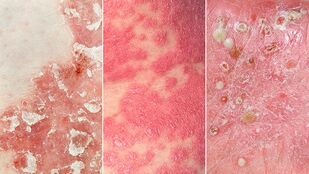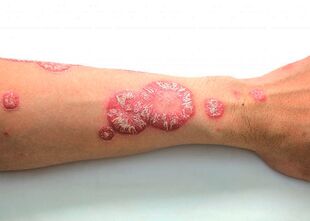The cause of psoriasis has not been accurately explained. But scientists agree that various factors can cause skin diseases. This is confirmed by medical research, expert observations. By considering the nature of the disease, we will assess the origin of the disease in children and adults; during pregnancy in women; in overweight people suffering from depression, CNS disorders.
Characteristics of this disease
Psoriasis (lichen scaly) is a serious autoimmune dermatological disease. The disease can be felt in infancy and adulthood. Under certain circumstances, patients experience severe relapse even after undergoing prolonged treatment. The duration of the remission period depends on the severity of the disease, age, general health, and the presence of chronic disease in the patient.
Externally, the disease manifests itself as pink spots - redness. A rash can occur on any part of the body. Often crusty. Exacerbation is accompanied by severe itching, spreading of the inflamed area to healthy areas of the epidermis.
Causes of psoriasis are still being studied; effective methods of psoriasis therapy are being developed with the aim of improving the patient's internal condition and cleansing the skin.
Causes of psoriasis
Psoriasis: The causes of this unpleasant skin condition are many. If a person is diagnosed with this diagnosis, the specialist prescribes treatment taking into account the existing heredity, predisposition to allergies, possible hormonal disorders, previous infections, metabolic disorders. Doctors take into account the diet, stress, the presence of bad habits, and the unhealthy lifestyle of the patient.
To explain the causes of psoriasis, health indicators are analyzed first, taking into account the age and gender of the patient. Then research is done on some generally accepted areas of theory, each of which will be considered below. A detailed summary of the results obtained helps the specialist prescribe effective treatment.
The most common form is:
- psoriasis guttate;
- palmar-plantar (psoriasis of the head, elbows);
- psoriasis nails, hands;
- psoriatic eritroderma (skin rash affects the whole body, including the head);
- pustular shape (plaque growth and excessive abscess);
- psoriatic arthritis of the joints (damage not only to the epidermal cells, but also inflammation of the joints, gradual deformation) and a few others.
Causes of disease in childhood
Psoriasis in infants and young children is caused by genetic predisposition. If a parent, close relative or family member suffers from any form of the disease, then in 80% of cases the child will inherit it. The disease may not appear immediately, but against the background of mild illnesses, such as viruses, the common cold. There are other causes of psoriasis in children:
The disease may not appear immediately, but against the background of mild illnesses, such as viruses, the common cold. There are other causes of psoriasis in children:
- Immune system disorders due to the attack of protective cells on their own tissues, referring them to others. When this process occurs, antibodies to the antigen in the scales are present in the child's blood.
- Congenital liver disease, acquired.
- Parasites in the gut.
- Mental disorders, severe emotional stress, dissatisfaction with oneself and others (often in adolescence), long-term experiences.
- Metabolic disorders: slows down metabolic processes, as a result of which body temperature remains low, "dangerous" cholesterol increases, there is a deficiency of B vitamins, the amount of element C in the epidermis, on the contrary, increases.
Medical practice confirms that the causes of psoriasis in children may be very individual.
Causes of psoriasis in adult men and women
What causes psoriasis in adults? The causes of psoriasis in women and men have a number of similar factors. But because of physiology, thyroid gland disorders, hormonal changes, women are at greater risk of getting sick in adulthood. Consider the symptoms of psoriasis in adults: in men and women.
For men
The disease traditionally begins with a specific skin lesion. Red spots and debris on any part of the body are signs of the early stages of the disease. Why does it appear?
Psoriasis in men appears against the background of phenomena such as:
- excessive central nervous system due to prolonged depressive conditions;
- drinking alcohol, smoking;
- overweight, slows down metabolism;
- living or working in a polluted environment;
- dry structure of the upper layer of the epidermis, the skin is less protected due to adequate moisture / water intake in small amounts.
For women
The causes of psoriasis in women are as follows:
- genetics;
- weakened immune system (fewer leukocytes are produced, nutritional quality of tissue deteriorates);
- vitamin A deficiency, group B;
- high cholesterol levels, metabolic disorders;
- infectious diseases that can not be cured in time;
- emotional disorders;
- Timeless thyroid gland disorders, which gradually lead to hormonal disorders.
Theory of psoriasis

After much research, analyzing the origins of eczema in children and adults, scientists began to adhere to several theories. They provide an understanding not only of the symptoms in the first and subsequent stages of the disease, but also explain the causes of the worsening of psoriasis, cases of relapse. Let us consider each theory.
Immune
According to doctors, any focal infection can be a cause of psoriasis on the body. For example, tonsillitis, which has become chronic, provokes immune failure. And disorders of the immune system are the first step to the development of dermatitis.
Accidental damage to the surface of the epidermis, to which the body reacts with autoimmune invasion, can lead to focal expansion, in which severe inflammation develops in the future. Rejection occurred. Further along the chain, with each damage to the skin, as a rule, psoriatic scales form.
Descendants
It is not difficult to understand the essence of hereditary theory, as mentioned above. If the patient's family, regardless of age, has a relative who suffers from autoimmune disease, there is still a high risk of getting sick.
Viral
According to viral theory, psoriasis is referred to as retroviral lymphotropic infection. Herbal antiviral drugs are often used in the treatment of psoriasis. It is believed that if a person has a predisposition to the disease, then his immunity will not be able to "fight" the psoriatic virus. Thanks to the latest technology, physical and chemical medical institutions are developing new drugs that can achieve long-term remission.
Allergies
Because psoriasis is a dermatological disease, allergy theory is still relevant today. Many doctors think that the disease is caused by allergies alone. This is especially true for psoriatic arthritis. Allergy theory is closely related to infectious theory, as the disease is a reaction of allergic tissues to the structure of streptococcal, viral bacteria.
Neurogenic
This theory is associated with functional disorders of the nervous system. Practice shows that many patients with psoriasis prior to the development of the disease experience mental, physical, burn, and infectious disease. The neurogenic effect is confirmed when the patient is given medication to normalize the autonomic and central nervous systems. It has been proven that depression, stress, emotional stress can trigger relapse.
Disorders of metabolic processes
Metabolic theory is based on many studies, observations of disease course, when patients, in addition to the disease under consideration, suffer from lipoid metabolic disorders. Excess weight directly affects the deterioration of blood composition, biosynthetic function of the liver. Toxins accumulate, protective function is reduced. The bottom line: the body "responds" to skin rashes. The early stages begin, plaques appear on the hands and palms.

Hormonal
Hormone theory is closely related to metabolic disorder theory. The causes of the development of psoriasis in terms of hormonal imbalances are studied, first of all, in women. Being overweight, obesity in men also causes hormonal disorders, causing eczema.
Infectious
Infectious theory along with parasitic theory are among the first. In 1879, scientists discovered a "parasitic fungus". But later studies do not confirm this fact. External infections affect immunity, and, therefore, can affect the onset of pathology. In practice, patients with psoriasis often suffer from the flu and viral diseases in the fall and winter.
Factors influencing the appearance of psoriasis
Factors that directly affect the development of psoriasis are shown in the table:
| Name | Early development risk (%) | Risk of recurrence (%) |
| Stress, trauma | 49 | 41 |
| Infection | 15 | 21 |
| Physical injury | 14 | 12 |
| Breastfeeding, teens, menopause | 6 | 6 |
| Hypothermia | 5 | 4 |
| Long-term medication | 3 | 6 |
| Alcohol poisoning | 2 | 3 |
| Long exposure to sunlight | 2 | 2 |
The factors presented are among the main ones. Let us consider some of them in more detail.
Infectious Diseases
Infectious diseases lead to the development of psoriasis in people with genetic predisposition; very weak immunity. Such diseases are:
- bronchitis;
- sore throat;
- pharyngitis;
- flu with complications;
- staphylococcal infection, fungus.
Untreated infections, self-medication or prescription illiterate drugs sooner or later cause dermatosis. It is important to see a doctor on time, not to start treatment.
Pregnancy
Pregnancy is characterized by global hormonal changes in the body. Immunity weakens because all strength is used to maintain fetal development. During pregnancy and subsequent lactation psoriatic skin rash appears. Usually, after the body's recovery, hormonal normalization, the disease disappears or disappears completely.
Injuries and damage to the surface of the epidermis
Mechanical damage to the skin can create a favorable environment for the development of dermatosis at the wound site. Psoriatic plaques will appear after healing. According to many dermatologists, the reason in this case is the body's aggressive reaction to its own cells.
Bad habits
Because alcohol abuse and smoking have a negative impact on everyone's health, doctors tend to believe that people with the habit are at risk. At a young age, the body will still have the strength to cope with such "burdens". But gradually health will decline. Bad habits, along with stress, are a major cause of psoriasis.
Use of illicit drugs

People with weak, emotional, overly vulnerable systems, and even those at risk are advised not to use their own medication. It is important to contact a competent specialist because of the possibility of using illicit drugs. Allergic reactions to drugs can cause dermatosis. Not all medications can be taken during pregnancy.
An illiterate approach to the treatment of mild illness may in the future trigger the development of serious autoimmune dermatosis.
Eating Disorders
Diet for psoriasis is a must. Keep in mind that with the help of certain food products, patients have the opportunity to overcome relapse quickly, combine the results and forget about creams and ointments for psoriasis.
Spiritual reasons
Psoriasis is the need to accept yourself, your illness, your skin, let go of guilt and be positive. Psychological factors, a person's mood is one of the causes of psoriatic eczema. The calm atmosphere, the successful result contributes to the normal healing process, getting a healthy skin surface.
Prognosis of disease
Psoriasis appears not only on the skin, but also on internal organs. For patients, it is important to respect their own health, mental state, and nutrition. The disease forces a person to choose: either a healthy lifestyle or psoriasis. Treatment involves not only the use of ointments and other means, but also cleansing the body from within, removing toxins. The key to success in the fight against psoriasis is based on a positive attitude, adherence to doctor's recommendations, diet and stress relief.
The key to success in the fight against psoriasis is based on a positive attitude, adherence to doctor's recommendations, diet and stress relief.























